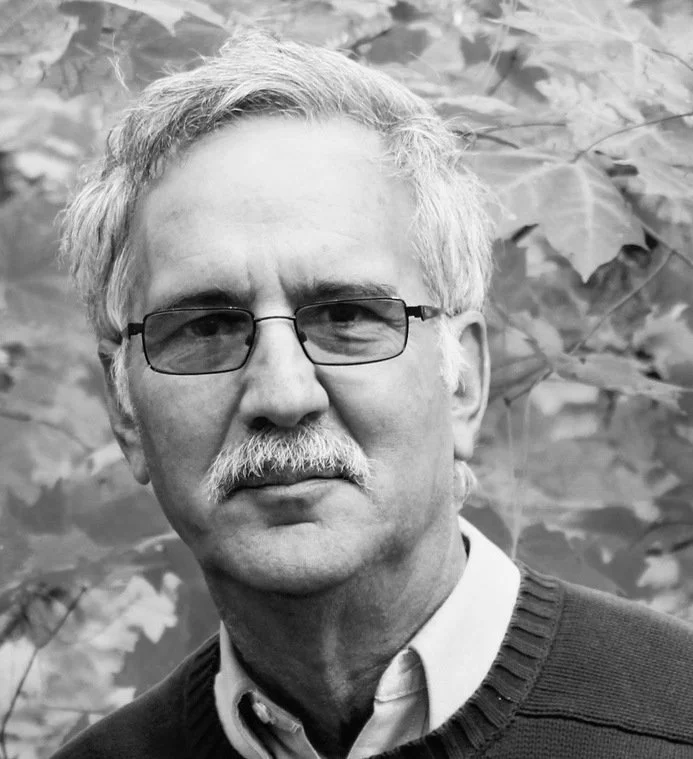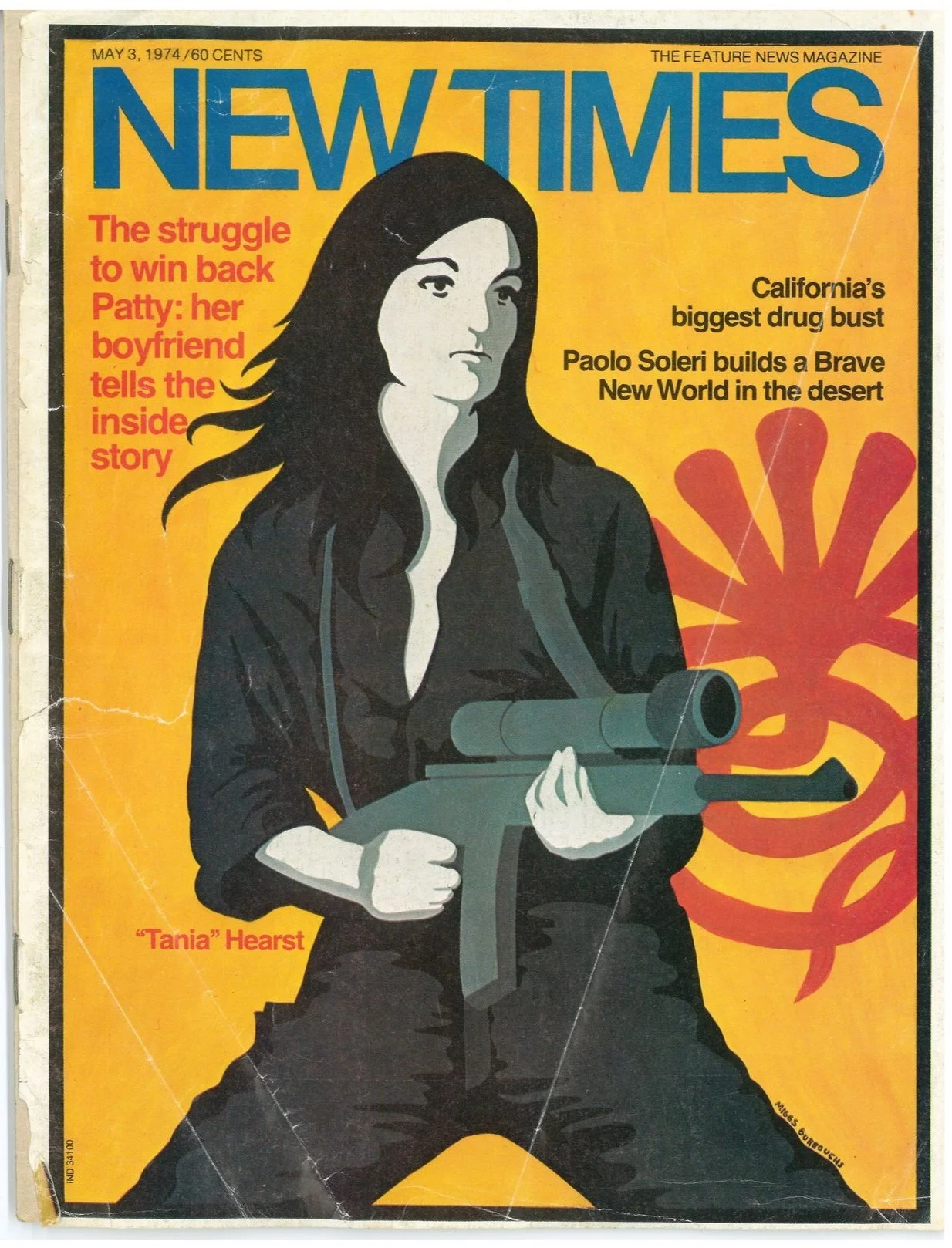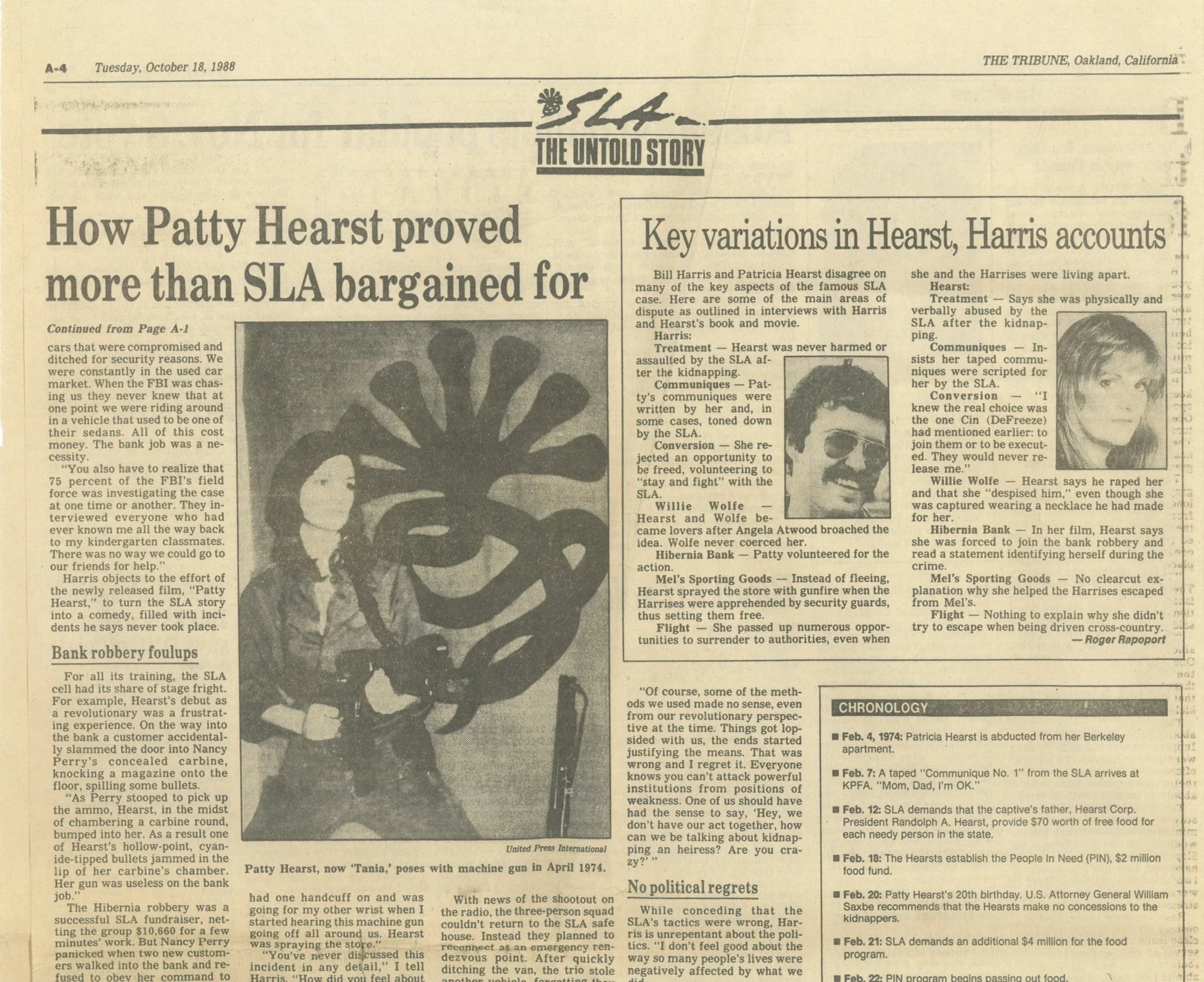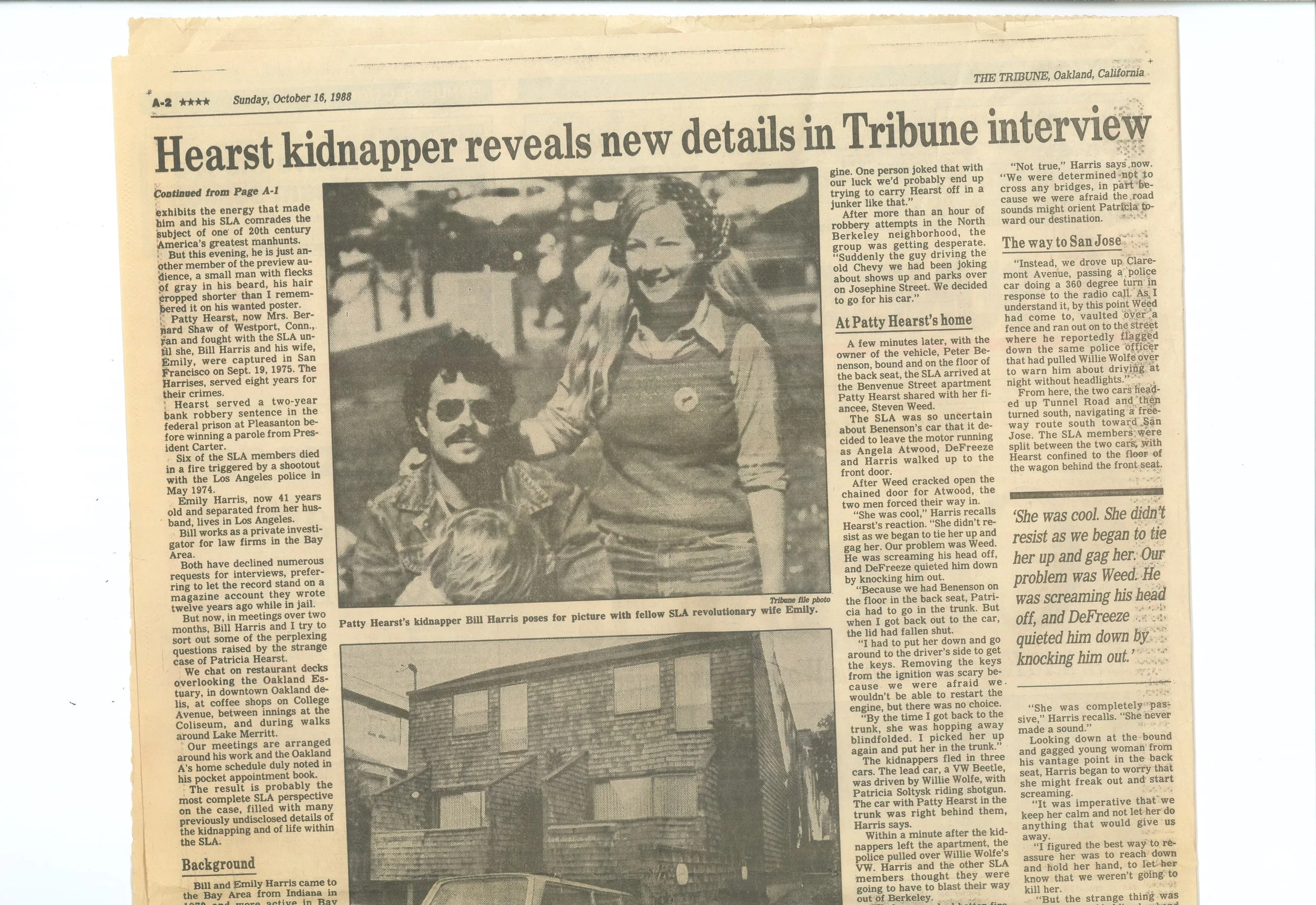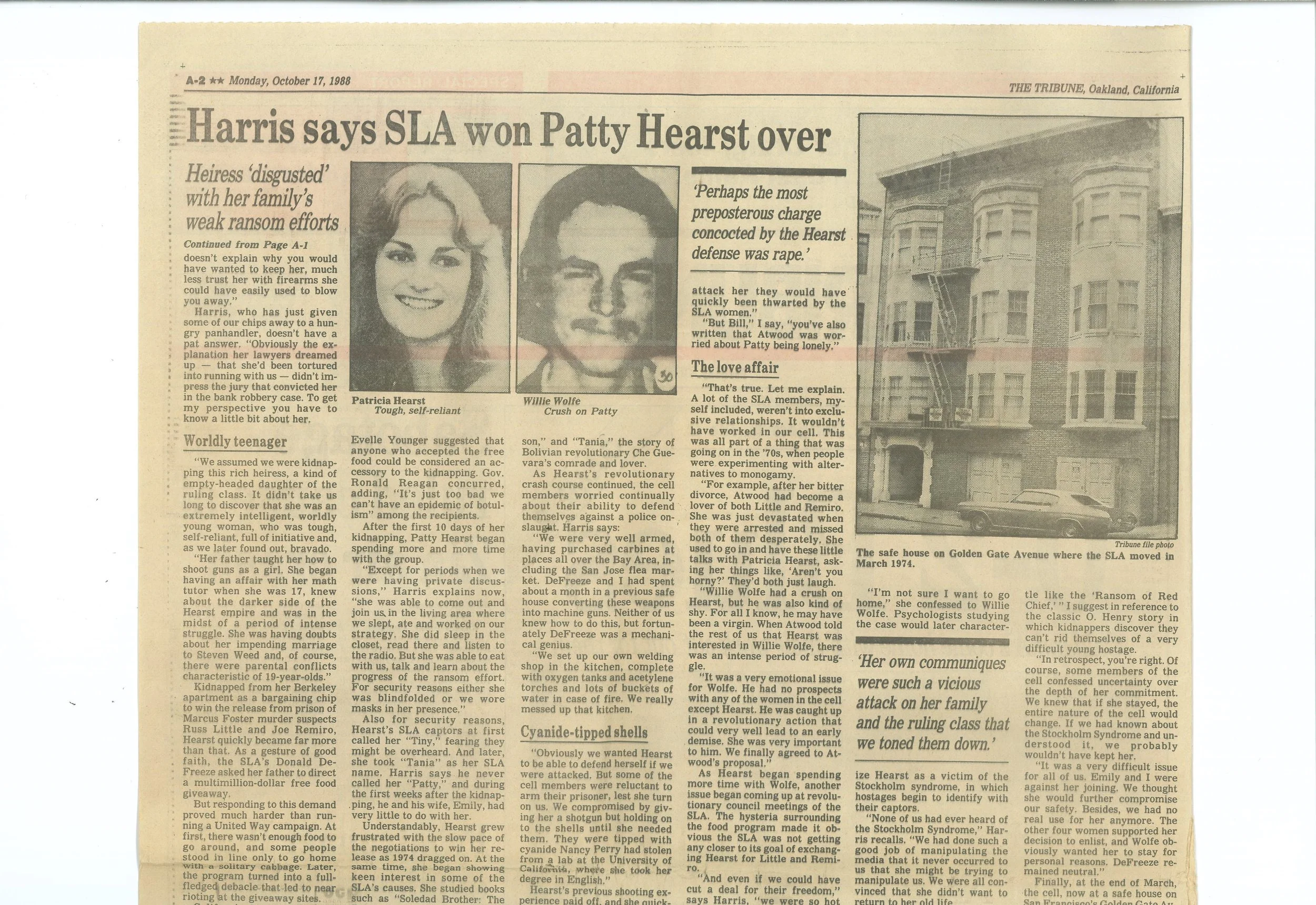Nothing but the truth
“I wrote this novel because I believed the American public deserved nothing but the truth. Very sorry about the delay. This book took a lot longer that I expected. Hope it was worth the wait.”
Award winning film producer, publisher, author and investigative journalist, Roger Rapoport has covered the Patty Hearst story for half a century.
From his front page story in the Wall Street Journal about life on a Ford Assembly line in his junior college summer of 1967 to his fascinating coverage of the aviation industry in Angle of Attack, Roger Rapoport has received many honors for his groundbreaking reporting over the past five decades. But perhaps the highest accolade of all is a comment made years ago by one of his first editors. “Roger’s problem is that he doesn’t understand the meaning of the word no.”
In 1974, Rapoport, a contributor to publications like the Atlantic, Esquire and Rolling Stone, went to work for New Times covering the kidnapping of Patty Hearst, a few blocks from his Berkeley home. His exclusive reporting focused on the life and times of Steve Weed , the fiance the Symbionese Liberation Army left behind as these revolutionaries stuffed the love of Weed’s life into a Chevy trunk and sped off into the night. Weed moved into Rapoport’s house where they wrote a big advance book together on the case. Shortly before completion the former Princeton marijuana dealer who began an affair with Patty when she was a 16 year old student at the high school where he taught, sued to block publication of the book. The following year one of Rapoport’s relatives, Los Angeles Superior Court Judge Mark Brandler (best known for the Onion Murders trial), presided over a key trial that included Patty Hearst as a defendant with two of the SLA members.
After covering the San Francisco Hearst bank robbery trial in 1975 he went on, thirteen years later, to score an exclusive Oakland Tribune with Bill Harris, the man who actually kidnapped Patty Hearst and wound up fleeing cross country with her and his wife Emily Harris.
While others let the story rest he interviewed Dr. Thomas Noguchi the coroner to Marilyn Monroe, Janis Joplin and Robert F. Kennedy as well as six of Hearst’s fallen Symbionese Liberation Army comrades. Year after year Rapoport continued to pursue people who refused to go public and ultimately became convinced that nonfiction accounts of the kidnapping, including Patty Hearst’s own account of her life on the run with her kidnappers, fell short.
While continuing to pursue the story behind the “official” version of the case he found time to write biographies of Governors Pat and Jerry Brown, and filmmaker Michael Moore. In the midst of all his research he founded a successful publishing company, became an award winning film producer and screenwriter (Coming Up For Air), and playwright (Old Heart). During this time he wrote for STAT News and Wired, and contributed to the Los Angeles Times, San Francisco Chronicle, San Jose Mercury News, the Jewish Telegraphic Agency and the Miami Herald.
“I wrote this novel,” says Rapoport, ‘because I believed the American public deserved nothing but the truth. Very sorry about the delay. This book took a lot longer that I expected. Hope it was worth the wait.”
1968
Moved to Berkeley. Lived that summer in Woodside on the Peninsula in the hills above Palo Alto.
Fall
Moved to San Francisco and met Margot Lind at Ramparts where I was a contributor.
1988
October interviewed Bill Harris for the Oakland Tribune.
1970
Moved to El Cerrito and married Margot.
1974
February Patty Hearst kidnapped when still living in El Cerrito and writing for New Times and other magazines and book publishers. Moved with Margot to Berkeley and we moved there in the spring of 1974 while covering the case for New Times.
May
Margot’s friend put Roger in touch with Steve Weed. Wrote an article about him for New Times in May 1974.
June
Agreed to ghost write a book with him for a $125,000 advance from Ballantine. He was to receive two thirds of that money.
July
Steve Weed moves into house in Berkeley and lived there for nearly six months, finally moving out in late 1974. By that time the book was nearly done and a second part of our advance was about to be paid.
December
Steve Weed filed suit to block the book we were writing for Ballantine which went to court in early 1975. He flew to New York and asked Ballantine to fire me and they refused to do so.
Journalism history
1978-1980
Columnist at the San Francisco Chronicle
Late 1970s-early 1980s
Wrote for Outside Magazine in the late 1970s and early 1980s when Will Hearst was the publisher. We were in contact at that time.
1983-1984
Worked for the San Jose Mercury News from 1983 to 1984.
1984-1990
Worked at the Oakland Tribune as a business and travel writer and did occasional special features.
1975
Ballantine cancels the contract (the second part of the advance was never paid) in January of 1975. This legal story was covered in local media.
March
Wrote a piece about the case that was published in New Times in. That story was submitted by Steve’s lawyer in a pretrial hearing in Alameda Superior Court that spring. The case was settled in late spring. He paid me $15,000 for my work, took back rights to the book, paid off Ballantine and published with another company.
April
Roger’s interview with Coroner Tom Noguchi in Los Angeles took place in the spring for his book The Superdoctors.
Later in 1975
After Patty was arrested covered part of the trial for the Los Angeles Herald Examiner (founded by William Randolph Hearst in 1903).
